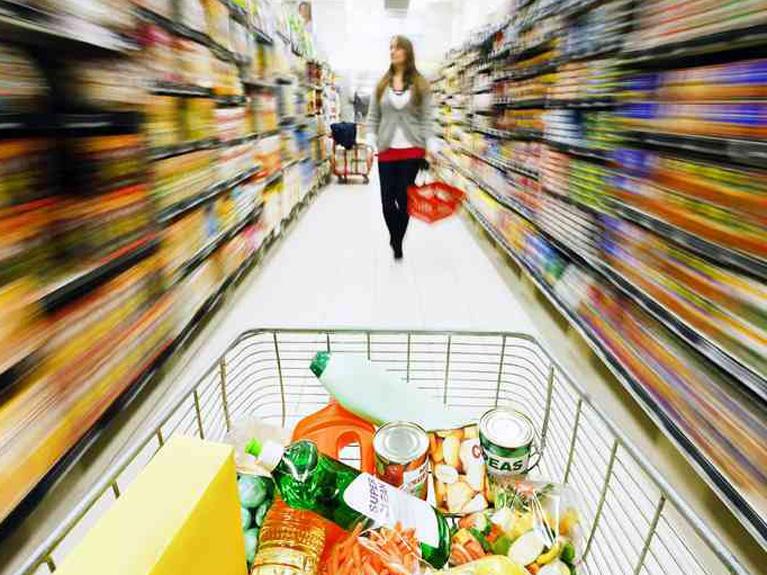Supermarket Trends: Technology, food safety and sustainability are top of mind
The supermarket industry is constantly changing. Consumer food choices and how they shop, frequent regulation modifications and new technologies to integrate are just a few things we gathered from recent customer input concerning the most pressing issues for the industry. As 2017 rolls along, there are four emerging trends we see that grocery marketers should be aware of for the remainder of the year.
1. Impact of the digitally engaged food shopper on retail facilities
Convenience continues to be a focus for store format changes. Digitally engaged food shoppers are continually seeking fresh items, quick access and new experiences. To keep up with this demand, retailers are competing with new shopping types and competition -- online, click and collect and the latest innovations in store layouts and formats.
To meet these challenges, retailers will need to expand flexibility and create new features in existing facilities while continuing to integrate information technologies and data into these new areas of their business. This will result in the eventual linking of the cold chain to the supply side of retail, just as digital engagement is changing the consumer side.
Eater-tainment in grocery stores has turned the corner store into a destination. When visiting a brick-and-mortar store, today’s consumers expect to be entertained and want customized shopping experiences. This concept does create increased in-store engagement for millennial shoppers, but flexible facilities are needed as shopping types change, new styles are introduced and consumer needs continue to evolve. Updated and scalable equipment and technology are needed to support these advancements.
2. Need for transparency in food safety
A variety of healthy, fresh food options are accessible from most grocers, as many food retailers have adapted their facilities to meet this consumer demand. Supermarkets are offering prepared food options in addition to onsite food preparation stations as store concepts converge to keep up with this trend. Delivering the fresh food that consumers want while keeping the food safe, reliable and profitable is also a concern.
In order to consistently deliver in this area and maintain food safety as well as control shrinkage, food retailers are depending on facility data to increase visibility and control of the store equipment that maintains product freshness. Being able to access real time performance data in order to address potential food safety issues such as equipment downtime or refrigerant leaks can also reduce maintenance costs and better energy efficiency.
In addition to Hazard Analysis Critical Control Point (HACCP) principles, the Food Safety Modernization Act (FSMA) requires those in the food industry to implement and document a program ensuring safe transport of food within the U.S. Preventing food loss and protecting customers from foodborne illnesses are critical concerns for retail store operators. By connecting the cold chain from farm to fork and focusing on monitoring and data, plus the new addition of cargo solutions and tracking can help address these concerns.
3. Continued focus on sustainability
Consumers are increasingly conscious of -- and concerned about -- the sustainability efforts of the brands they support. For many shoppers, a retailer’s reputation, as well as its impact on the environment, have become important factors in selecting where they shop. Food retailers need to achieve sustainable, optimized operations by providing solutions that address energy efficiency and ensure food safety.
Retailers can take advantage of different types of monitoring reporting to maximize energy performance across an enterprise of stores. Setpoint management helps retailers to sustain energy savings in the long term while ensuring that operational issues are actually fixed rather than given a temporary Band-Aid. Retailers can also earn financial incentives from utilities, conserve energy, minimize power interruptions, increase energy reliability and protect the environment by reducing power usage at times when demand on the electric power grid is high.
Refrigeration leak detection and minimization programs are also critical. Supermarkets must meet new regulatory requirements to avoid costly EPA fines related to refrigerant leaks. When you examine the cost of lost refrigerant, the degradation of refrigerated system performance and the potential for eventual food loss, the business case for implementing effective leak detection programs is clear.
Food retail facilities generate a significant amount of data, with information on key building systems, including HVAC and refrigeration equipment, which can provide an extensive picture of how their operations are running. Facility data is only going to become more valuable as new technologies are assimilated into an enterprise. The use of accrued performance tracking data can improve maintenance activities and allow management to plan out preventive maintenance measures.
4. Leveraging IoT and connected devices to optimize energy efficiency.
Recent retail customer feedback has shown that energy costs continue to be a top concern. With the use of the Internet of Things (IoT) and connecting coolers, freezers, HVAC units and others power-using equipment to a centralized program, retailers can get an accurate picture of their energy use. The information allows them to manage equipment performance and utilize settings for optimum temperatures and lighting.
Data insights from continuous remote monitoring help identify problem areas and opportunities for efficiencies, which can ultimately reduce costs. A solid IoT plan is critical to meeting customer expectations and building a positive brand.
Conclusion
As 2017 unfolds, change will be the one constant we can depend on. Successful grocery retailers will come through these fluctuations stronger by leveraging technology and adopting smart strategies to maintain food safety and sustainability, while making smarter business decisions that benefit their customers.


